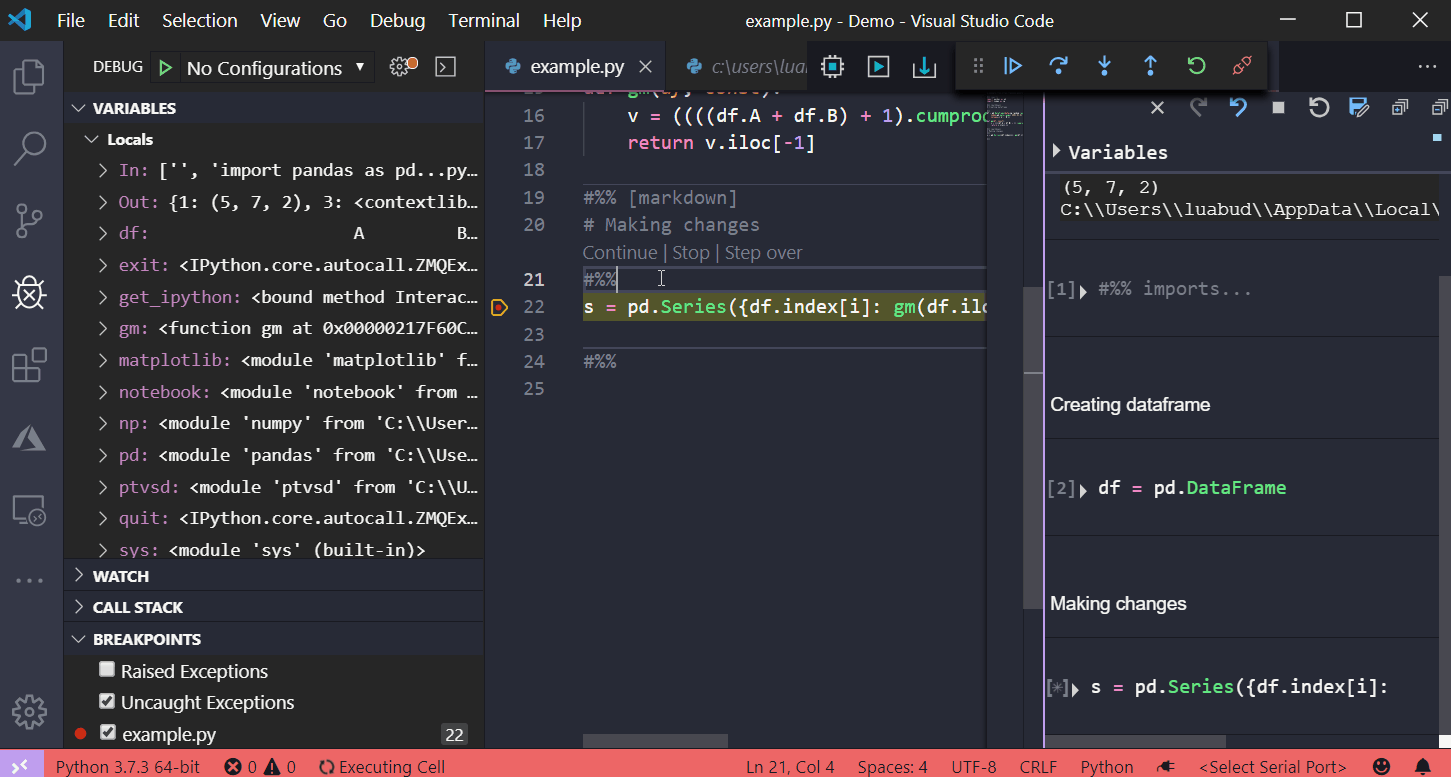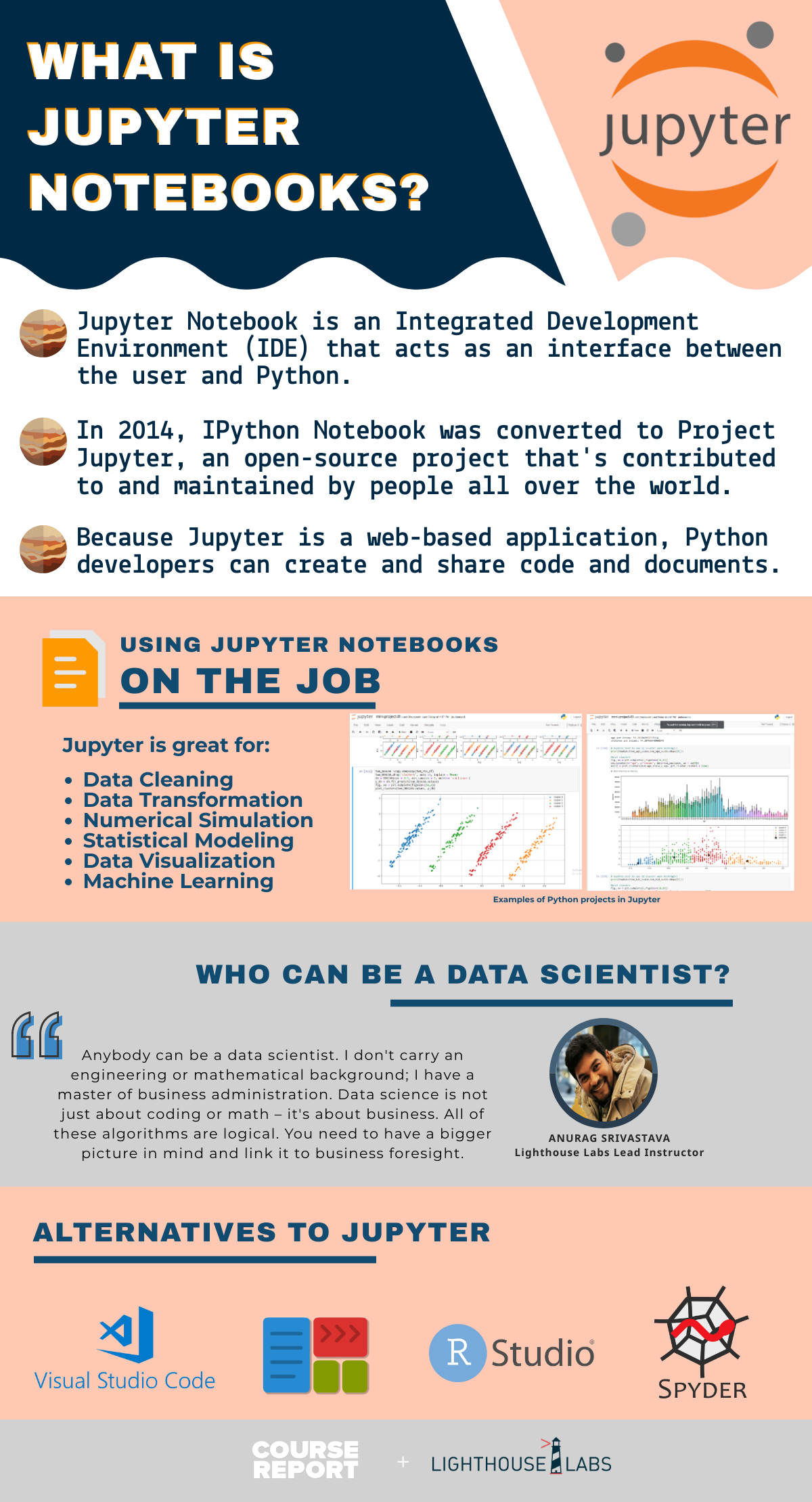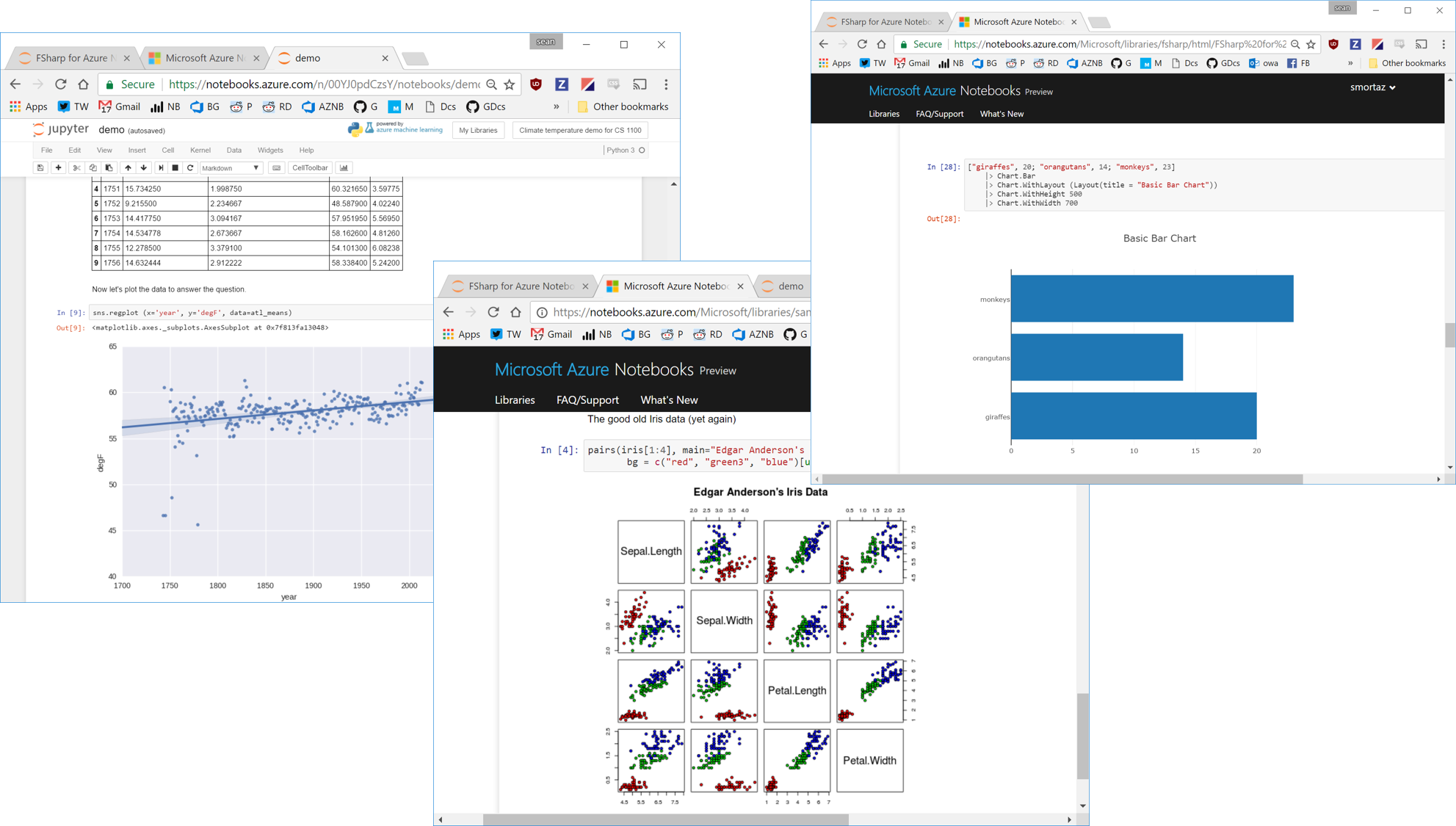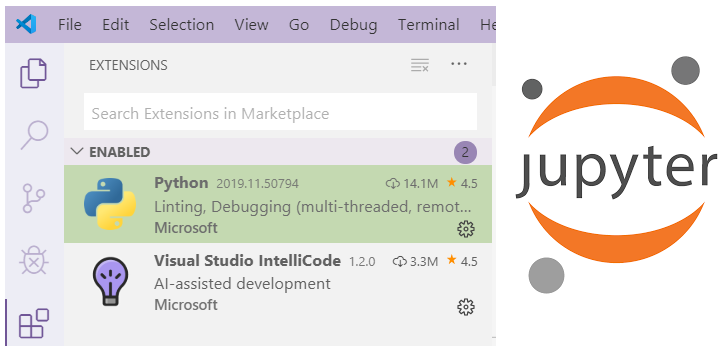- Visual Studio 2019 Jupiter Notebook Full
- Visual Studio Community 2019 Jupyter Notebook
- Jupyter Notebook Vs Code
- Jupyter Notebook With Visual Studio 2019
- Visual Studio Code Change Python Env Jupyter
- Jupyter Visual Studio Code
- Visual Studio Code Jupyter Notebook
Python Tools for Visual Studio is a completely free extension, developed and supported by Microsoft with contributions from the community. Visit our Github page to see or participate in PTVS development. Extensions 🔗 Code starts out as a lightweight editor that’s extensible via extensions. That allows you. The Jupyter Notebook The Jupyter Notebook is an open-source web application that allows you to create and share documents that contain live code, equations, visualizations and narrative text. Uses include: data cleaning and transformation, numerical simulation, statistical modeling, data visualization, machine learning, and much more.
Visual Studio Code is a free, cross-platform, open source code editor from Microsoft. You might have also heard it called VS Code, or sometimes, just Code.
It’s the editor I use and enjoy daily. You may already know that it’s an excellent option for Python developers – it supports linting, debugging, features AI-assisted code auto completion, and more.
With just a little configuration Code can also be so much more!
Learn about three exciting features in Code below.
1: Extensions 🔗
Code starts out as a lightweight editor that’s extensible via extensions. That allows you to only install the tools and plugins that are useful to you.
When you first download and install Code, you’ll have a pretty bare bones editor. It comes with simple support for languages like JavaScript, TypeScript, CSS, and HTML, but support for other languages can be downloaded as extensions.
The extension ecosystem isn’t just for languages. You can also find useful plugins, lightweight tools, themes, customizations, key maps to use keyboard shortcuts from other editors, and much more.
Some of my favorite extensions are:
- Python Extension
- Rich feature support for the Python language. Awesome features like AI-powered IntelliSense, Jupyter notebook support, a test explorer, and more!
- autoDocstring
- Quickly generate docstrings for Python functions.
- GitLens
- Supercharge git by with at-a-glance git blame annotations, navigation of git repositories, powerful comparison commands, and more.
- Night Owl theme
- A Visual Studio Code theme for the night owls out there. Fine-tuned for low-light situations, for those who like to code late into the night.
- Peacock
- Allows you to change the color of each new window, allowing quick visual identification when working on multiple projects.
- TODO Highlight
- Really make your
TODOs andFIXMEs pop!
- Really make your
🌌 Ahhh I finished it! (Omg, I could keep working on this forever)
I made a @code theme! It's called Night Owl. I some research into what works best for low light, colorblindness contrasts, and comprehension! Previews use @_philpl's Dank Mono w ligatureshttps://t.co/iDTmrt4TCzpic.twitter.com/0NZ7Nxmmjh
If you think you won’t be using a plugin for a while, you don’t have to go through the effort of completely uninstalling it. Instead, you can temporarily disable it.
Configure your settings for both Code and Extensions via settings.
2: Jupyter Cell Debugging 🐞
The Python extension has many great features that allow you to work with Jupyter notebooks with ease – in a full-fledged IDE environment.
If you use Jupyter notebooks, you know how hard debugging can be. The annoyance of having to switch between your browser, your terminal, your notebook, and your editor can be a real drag.
To help your workflow, the latest Jupyter feature – Cell Debugging – is coming soon to the Python Extension for Code!
Visual Studio 2019 Jupiter Notebook Full
Here it is! A preview of the #jupyter cells debugging feature inside @code - showed off at @europython for the first time, is coming up in the #python extension @pythonvscode shortly! ✌️ pic.twitter.com/3KHUUreBRd
— Rong Lu (@davorabbit) July 10, 2019As you can tell from the tweets, it’s a highly anticipated feature!
Soon, support for debugging Jupyter cells will be available inline.
It’s a feature that will save you tons of time, and that’s cause to celebrate! 🎉
3: Live Share 👥
I work remotely from Portland, OR. As a remote developer, being able to collaborate with others is a top priority.
Visual Studio Community 2019 Jupyter Notebook
Collaborating remotely on software has long been a struggle. Thankfully, Visual Studio Code has a plugin that makes the process simple and pain free – Live Share.
Before you were likely stuck using tools like tmux with text-based editors, or dealing with spotty network connections, blurry screens, and fading audio on video calls.
The Live Share extension improves the process of remote collaboration by leaps and bounds.
To get started, you and the developer you’d like to work with will both need to install Code, then download the Live Share extension pack. Now, one of you will need to start a shared session, and the other person will need to join the session.
Once you do, you’ll be able to collaborate easily. Your teammate will be able to see your code in their editor, without having to clone a repo, or even install dependencies from your codebase.
You’ll see the other person’s cursor, but you can also navigate independently in your own Code instance. That means your themes, keyboard shortcuts, extensions, and custom settings are available to you. As a bonus you can even chat or talk over audio with your coding partner.
This feature is particularly useful for Code Reviews. Let’s say you’d like to talk through some comments you made on someone’s pull request. Just start a live share session, checkout the PR branch (use the GitHub Pull Requests extension to make it even easier), and that’s it. Sometimes it’s easier to talk through a miscommunication than leave endless back-and-forth comments.
That’s genuinely the best possible scenario for collaboration.
Wrapping Up
Many other features of Code deserve mention – remote development over SSH, Containers, or Windows Subsystem for Linux, snippets, and more.
That’s the benefit – you don’t have to dive in all at once. You can explore the features of Code at your own pace. So if you haven’t given it a try yet, there’s no time like the present. Download Visual Studio Code, read the getting started with Python guide, and share your thoughts in the comments below.
-->Learn how to set up the Quantum Development Kit (QDK) to develop quantum computing and optimization applications on your environment.
The QDK consists of:

- The Q# programming language
- A set of libraries that abstract complex functionality in Q#
- APIs for Python and .NET languages (C#, F#, and VB.NET) for running quantum programs written in Q#
- A Python SDK to handle use optimization solvers on Azure Quantum
- Tools to facilitate your development
Set up the Quantum Development Kit to develop quantum computing applications in Q#

Q# programs can run as standalone applications using Visual Studio Code or Visual Studio, through Jupyter Notebooks with the IQ# Jupyter kernel, or paired with a host program written in Python or a .NET language (C#, F#). You can also run Q# programs online using MyBinder.org, or Docker.
Options for setting up the QDK for quantum computing
Jupyter Notebook Vs Code
You can use the QDK in three ways:
Jupyter Notebook With Visual Studio 2019
Install the QDK for quantum computing locally
You can develop Q# code in most of your favorites IDEs, as well as integrate Q# with other languages such as Python and .NET (C#, F#).
VS Code (2019 or later) | Visual Studio (2019 or later) | Jupyter Notebooks | Command line | |
|---|---|---|---|---|
| OS support: | Windows, macOS, Linux | Windows only | Windows, macOS, Linux | Windows, macOS, Linux |
| Q# standalone | Install | Install | Install | Install |
| Q# and Python | Install | Install | Install | Install |
| Q# and .NET (C#, F#) | Install | Install | ✖ | Install |

Use the QDK for quantum computing Online
You can also develop Q# code without installing anything locally with these options:
| Resource | Advantages | Limitations |
|---|---|---|
| Binder | Free online notebook experience | No persistence |
Visual Studio Code Change Python Env Jupyter
Use the QDK for quantum computing with Docker

You can use our QDK Docker image in your local Docker installation or in the cloud via any service that supports Docker images, such as ACI.
You can download the IQ# Docker image from https://github.com/microsoft/iqsharp/#using-iq-as-a-container.
You can also use Docker with a Visual Studio Code Remote Development Container to quickly define development environments. For more information about VS Code Development Containers, see https://github.com/microsoft/Quantum/tree/master/.devcontainer.
The workflows for each of these setups are described and compared in Ways to run a Q# program.
Set up the Quantum Development Kit to manage optimization solvers in Azure Quantum
Jupyter Visual Studio Code
You can use the Python SDK of the Quantum Development Kit to solve optimization problems using Azure Quantum solvers.
Visual Studio Code Jupyter Notebook
To set up the Python SDK, follow the steps in Install and use the Python SDK for optimization.
